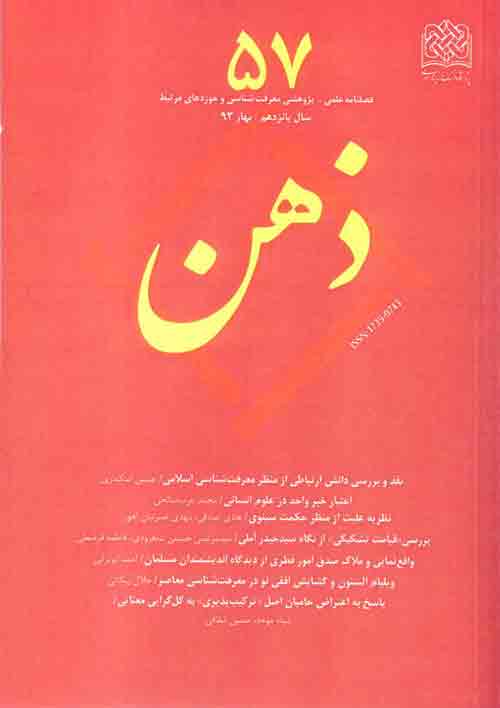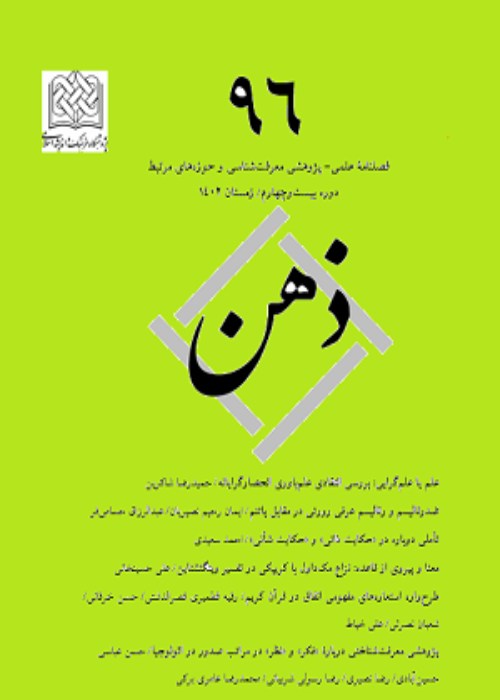فهرست مطالب

فصلنامه ذهن
سال پانزدهم شماره 1 (پیاپی 57، بهار 1393)
- بهای روی جلد: 60,000ريال
- تاریخ انتشار: 1393/03/24
- تعداد عناوین: 7
-
-
صفحه 35
-
صفحه 61
-
Page 5This article aimed to survey and criticizes a new epistemological theory-named connective or distributed knowledge- by descriptiveanalytic method. Although, this theory is close ten years old, has been considered by many academic communities. Connective knowledge climes besides the rational and experimental knowledge, has detected and introduced a third kind of knowledge that is appropriate to digital age. The article has two main sections. At first, epistemological bases and characteristics of connective knowledge have been extracted and then, criticized from Islamic (Sadra) epistemological view. In first section, the outstanding characteristics of connective knowledge, such as the source of knowledge, validity, emergence, pluralism, truth and justification, have been recounted. In second section, reductionism of connective knowledge has been criticized. Interpenetration and extension of findings and rules of other (experimental) sciences into epistemology and humanities context, and also unification of rules of neural, technological and social networks, could be mentioned as the signs of reductionism in connective knowledge. Materialistic view to knowledge is another critique from Islamic epistemology. In spite of various critiques, there are several common points between Islamic and connective epistemology, such as belief in ontological objectivity and proximate knowledge.Keywords: connective knowledge, distributed knowledge, Islamic epistemology
-
Page 35Discussion of the sources of Humanities is one of the problems of the philosophy of Humanities. Those who admit the possibility of Islamic Humanities, consider the religious texts as one of the sources of Islamic Humanities.The discussion of the validity of authority of "Khabar" and "Al-Amarat Al-Dhanniyah" (Probable Signs) in beliefs and in the interpretation of the holy Quran is previously proposed in the discourses of Al-Usuliyyin (Scholars of the Principles of Islamic Jurisprudence) in addition to the discussions on religious science and Islamic Humanities. The quality of the issues and arguments that is deployed for the authority or no-authority of "Khabar" in the interpretation of the holy Quran, would apply to Humanities and other religious knowledge. Therefore, in this article it is preferred to propose the foundations of the discussion based on the same context and then to analyze the modern issues and viewpoints in Humanities. Seemingly, if the validity and authority is in its Usuli sense that is Munajjiziyyah (Absolute Obligation) and Muazziriyyah (Excusing from an Obligation) then "Khabar Wahid" and any kind of "Al- Amarat Al-Dhanniyah" does not have authority; because the interpreter of the holy Quran and the scholar of Humanities is looking for reality, like the scholars of Kalam or Theology. It is reputable among the Fuqaha and Al-Usuliyyin that "Khabar Wahid" does not have authority for anything except Islamic commandments; but meanwhile some of the researchers believe in the authority of "Khabar Wahid" for interpretation of Quranic verses that the article reviews some of the viewpoints. As previously mentioned, this discussion is not exclusive to the Quranic verses; rather it can be extended to a wide scope of all disciplines of Humanities and natural sciences. The discussion on validity or invalidity takes place in the Quranic verses or narrations regarding to any discipline of Humanities such as History, Interpretation, Psychology, Sociology, Education, and Ethics and so on as well as disciplines of Natural sciences such as Biology, Medicine and so on. This article firstly presents and criticizes the viewpoints of the proponents of authority, then proposes and criticizes two other views.Keywords: Khabar Wahid, Islamic Humanities, interpretation, validity, rational precaution
-
Page 61Causation theory is one of the solutions provided to explain the relation between God and other beings. In addition to the content of causation principle, the theory proceeds to explain the kind of Gods agency and factors which are of influence in making creatures. To correctly explain the causation theory, one needs to study Divine knowledge as well as Divine agency. In the present writing, the causation theory has been discussed from Sinean viewpoint and a particular explanation of Divine knowledge has been provided from this viewpoint. Though in the present writing, for two objections (from among three objections posed against this theory) replies were provided; finally, the third objection was accepted and, thus, Sinean causation theory was challenged.Keywords: Divine knowledge, agency by providence, principle of causation, causation
-
Page 77Cognition to resurrection and its conditions is a necessary introduction for Unitarianism understanding to intuitionalists, since the meaning of resurrection is to refer to the source. Some intuitionalists not only indicated one resurrection but also expressed it by different cases in accordance to the souls’ upswing levels as well as plurality of human understanding levels. Unlike the common view, they denote that resurrection occurs multiply in different types and continuously rather than once. In this paper, Sayyed-Haydar e Amoli’s approach based on intuitional insight and special anthropology is reviewed to discuss resurrection and doomsday.Keywords: Doomsday, appearance, inwardness, perdition, permanence, soul, religious low, religious way, reality
-
Page 107The author of this article, has, first of all, related different meanings of innate ideas. He has then touched briefly their different kinds. From among the meanings and kinds mentioned, he has picked up the meaning and kinds that best suit indication in innate ideas, elaborating then on the exact kind of indication each innate idea has. After relating some preliminary remarks, he presents and criticizes theories expressed by the Moslem philosophers on the indication of innate ideas. On the basis of the theories presented by the Moslem philosophers, one can present five arguments in favor of the fact that innate ideas are indicative. These five arguments are based on one of these bases: theory of likeness between man and God (that is similarity between the creation of man and God), theory of god,s wisdom, theory of superiority of human, theory of world of preexisitence, and correlation,law of. The author has proven here that none of these arguments can prove that innate ideas are indicative.Keywords: Innat Knowledges, Indication of truth, critrion of truth, likeness between man, God, god, s wisdom, superiority of human, world of pre, exisitence, correlation, law of, the Moslem philosophers
-
Page 135We rarely find some considerations on Alstons later epistemic approach. In his last book, Alston exploring all of the theories of knowledge and epistemic criteria, which presented by different philosophers, asserts that no theory and criteria alone could explain the knowledge and justification completely. But, depending to the context and the circumstances, we should take a particular rule and mechanism. By this means, he rejects current foundries between internalism and externalism. In this paper, we first express Alstons later considerations and then explain the main epistemological problems; and finally we show that Alstons later considerations has the potentiality of resolving those problems as a creative outdoor.Keywords: William Alston relibilism_doxastic practices truth conductivity epistemic Desiderata
-
Page 157According to meaning holism (MH), meaning of any expression of a language depends to meanings of other expressions of it. This theory has two rivals: meaning atomism (MA) and meaning molecularism(MM). Meaning holism is incompatible with "meaning compositionality" (MC). On the other hand proponents of MC think it is indispensable for any explain of facts like "language use" and "learning language". Then MH (that rejects MC) cant explain facts like these. So MH must be false. There are three responses, by some proponents of MH (Brandom, Block & Pagin), to this objection. But any of these responses is not satisfactory: rather because they dont response to the objection completely, or because they reform MH so much so that their version of MH doesnt correspond with usual version of MH (but, e.g., corresponds with MM). Ultimately we offer forth response. This response has two properties: (1) it correspond with usual version of MH. (2) it can explain facts like language learning and use.Keywords: Meaning holism, meaning atomism, meaning molecularism, meaning compositionality, learning language


